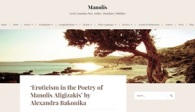
Poem by George Seferis
IV
Argonauts
And the soul
if it is to know itself
must look
into its own soul
the stranger and the enemy, we have seen him in the mirror.
They were good boys, the comrades, they didn’t complain
about the tiredness or the thirst or the frost
they had the behaviour of the trees and the waves
that accept the wind and the rain
that accept the night and the sun
without changing in the middle of change.
They were good boys, for days on
they sweated at the oars with lowered eyes
breathing in rhythm
and their blood reddened a submissive skin.
Sometimes they sang, with lowered eyes
when we passed by the deserted island with the prickly pear trees
toward the west, beyond the cape of the dogs
that bark.
If it is to know itself, they said
it must look into its own soul, they said
and the oars struck the gold of the sea
in the sunset.
We passed by many capes, many islands, the sea
that brings another sea, gulls and seals.
Sometimes grieving women wept
lamenting their lost children
and others angrily sought Alexander the Great
and glories lost in the depths of Asia.
We moored on shores filled with night fragrances
with bird chirps, with waters that left on our hands
memory of a great happiness.
But the voyages did not end.
Their souls became one with the oars and the oarlocks
with the solemn face of the prow
with the rudder’s wake
with the water that shattered their image.
The comrades died one by one
with lowered eyes. Their oars
point to the place where they sleep on the shore.
No one remembers them. Justice.








